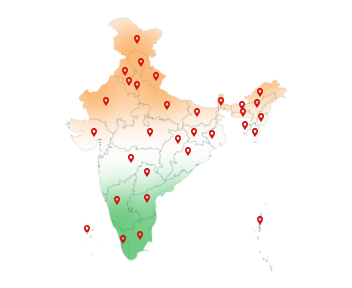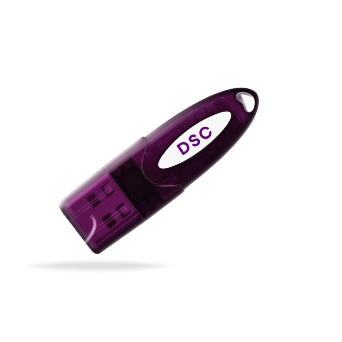12-Nov-2025
eSign vs DSC vs eStamp: What's the Difference?
India's digital revolution hasn't just changed how we work. It has transformed how we sign, authenticate, and validate documents.
Whether you're signing an employment contract, filing returns, or executing a business agreement, three digital tools power this ecosystem. Some of these advanced tools are eSign, Digital Signature Certificate (DSC), and eStamp.
They're often used together, sometimes interchangeably, but they're not the same. Each one represents a different layer of digital trust.
But if the difference is so hard to see, then it will be even more difficult to know which one to use where?
Here, you can understand how they work to make your online agreements legally binding and secure. So you can choose accordingly which one must be used in your next document!
Looking for a government-approved Digital Signature? Buy Capricorn DSC, trusted by thousands of professionals across India.
Different Ways of Signing a Document
The way we “sign” has evolved far beyond pen and paper.
What was once a physical act is now a digital identity check—one that must prove who you are, what you agreed to, and when you did it.
In the digital world, intent alone isn't enough. It needs to be backed by verifiable identity, encryption, and legal recognition. A mere click or typed name won't always hold up in court or on government platforms.
India's digital ecosystem relies on structured, legally recognized tools for signing: eSign, Digital Signature Certificates (DSCs), and eStamping.
What is eSign?
An eSign is an Aadhaar-based electronic signature service that allows you to sign a document online through either OTP or biometric authentication. It's legally recognized under the Information Technology Act, 2000, giving it the same weight as a handwritten signature, provided it's used within the prescribed framework.
What makes eSign powerful is its accessibility. You don't need a USB token, certificate, or specialized software, just an Aadhaar number linked with a mobile number. Within seconds, your identity is verified, and your signature is embedded securely into the document.
Who issues it?
eSigns are issued by Certifying Authorities who operate under the supervision of the Controller of Certifying Authorities (CCA), Government of India.
Key Features of eSign
Here are some features of eSign:
1. Instant and paperless: No physical token or hardware needed.
2. Legally valid: Recognized under Section 5 of the IT Act, 2000.
3. Single-use certificate: Each eSign generates a new certificate valid for that transaction only.
What is a Digital Signature Certificate (DSC)?
A Digital Signature Certificate isn't just a way to sign documents. It's your verified digital identity. It confirms who you are in the digital space and ensures that the documents you sign are authentic, secure, and tamper-proof.
It's your online signature backed by government-approved encryption. A DSC is a cryptographically secure certificate that binds your name or your organization to a unique public key.
That's why DSCs are used wherever trust and compliance are non-negotiable: for Income Tax filing, company incorporation (MCA), EPFO approvals, DGFT applications, and eTendering.
Who issues it?
DSCs are issued by Certifying Authorities (CAs) licensed by the Controller of Certifying Authorities (CCA), under the Ministry of Electronics and Information Technology (MeitY).
One of the best Certifying Authorities in India includes Capricorn CA. If you are looking to buy your Digital Signature Certificate, this can be a good option.
Key Features of DSC
Here are some features of Digital Signature Certificate:
1. High-assurance digital identity: Establishes the signer's identity using encryption.
2. Legally recognized: Fully valid under the IT Act, 2000.
3. Multiple classes: Class 1 DSC, Class 2 DSC, and Class 3 DSC are available. Plus, Organization, and Individual types, depending on use.
4. Longer validity: Usually valid for 1, 2 or 3 years.
5. Hardware-protected: Typically stored in a USB token or cryptographic device to prevent misuse.
6. Mandatory for compliance: Required for e-filing, company incorporation, DGFT licenses, EPFO approvals, GST filings, and more.
What is an eStamp?
A little different from the previous two. An eStamp isn't a signature; it's proof that you've paid the required stamp duty for a document.
In simple terms, it's the digital version of traditional stamp paper, used to make agreements and contracts legally valid in India.
Whenever you execute a legal or financial document, the law requires you to pay stamp duty. For example, a rental agreement, sale deed, partnership deed, or affidavit.
Earlier, this was done by purchasing physical stamp paper from a vendor. Now, it's done electronically through eStamping, which is faster, safer, and nearly impossible to forge.
Who Issues It?
eStamps are issued by the Stock Holding Corporation of India Limited (SHCIL) and the organizations authorized by it.
Key Features of eStamp
Here are some features of eStamp:
1. Digital Alternative to Stamp Paper: Fully replaces physical stamp paper.
2. Verifiable Online: Every eStamp certificate carries a unique identification number (ECN).
3. Legally Valid: Accepted in all courts and departments across India.
4. Secure & Tamper-Proof: Prevents duplication or counterfeit stamp papers.
5. Used For: Agreements, sale deeds, affidavits, leases, mortgage deeds, and other legal documents.
eSign vs DSC vs eStamp — Key Differences
While all three are part of India's move toward paperless documentation, each serves a unique purpose. Here's how they differ:
Major Difference between eSign & Digital Signature & eStamp
eSign
How It Works: The signer verifies identity using Aadhaar OTP or biometric authentication.
Validity: Works per transaction (valid for one-time use only).
Security Level: Moderate — suitable for day-to-day use.
Best For: Individuals or organizations that need quick, one-time signatures without a token-based setup.
Digital Signature Certificate (DSC)
How It Works: Involves public key encryption; the certificate is stored securely in a USB token or system drive.
Validity: 1–2 years, renewable.
Security Level: High — provides encryption, identity verification, and non-repudiation.
Best For: Businesses, professionals, or government users who need secure, repeated, and legally recognized signing.
eStamp
How It Works: Generates a unique eStamp Certificate Number (ECN) after online payment of stamp duty.
Validity: Permanent for that document — once issued, it never expires.
Security Level: Prevents duplication and forgery of stamp papers.
Best For: Anyone needing a legally enforceable agreement with proper stamp duty payment.
When Should You Use Which?
Use eSign When...
- You need to sign a document quickly without any hardware or installation.
- You don't need a reusable digital certificate — just a simple, on-the-go signing method.
Use a Digital Signature Certificate (DSC) When…
- You're dealing with official, regulatory, or high-value transactions.
- You need to sign documents on government portals — like Income Tax, MCA, DGFT, or eTendering platforms.
- You want a secure, encrypted, and reusable digital identity for repeated use.
Use eStamp When...
- You need to pay stamp duty online instead of using physical stamp paper.
- You want to make sure your document is legally enforceable and recognized in court.
Want to buy a Digital Signature Certificate online? Buy Class 3 Capricorn DSC — 100% legal, secure,
FAQ: eSign vs DSC vs eStamp
1. What is the difference between DSC and eSign?
A Digital Signature Certificate (DSC) is a reusable, encrypted certificate that verifies your identity for signing documents multiple times — typically used for official or government filings.
An eSign, on the other hand, is an Aadhaar-based one-time digital signature used for quick, everyday signing needs.
2. What are the four types of signatures?
Broadly, there are four main types of signatures:
Physical Signature – Signed physically with pen and paper.
Electronic Signature (eSign) – Aadhaar-based digital signing.
Digital Signature Certificate (DSC) – Encrypted, identity-verified signature.
eStamp – Not exactly a sign. Legally stamped document, often combined with a digital or electronic signature.
3. Are eSign and digital signature the same?
Not exactly.
An eSign is it's limited to Aadhaar-based, one-time use.
A DSC, however, is a more advanced form of digital signature backed by a Certifying Authority and can be used repeatedly for secure and official purposes.
4. What is Type 3 Digital Signature?
A Class 3 (Type 3) DSC is the highest level of digital signature used in India. It offers strong encryption and is mandatory for eTendering, eProcurement, and high-security government transactions.
It ensures both identity authentication and data integrity for sensitive filings.
5. How long is a DSC valid?
A DSC is generally valid for 1, 2 or 3 years, depending on the certificate you purchase. After that, it must be renewed through the same or another Certifying Authority.
6. What is the cost of DSC for 1 year?
The cost of a DSC for 1 year varies. It typically depends on the provider, class type, and whether it's for an individual, organization, etc.
7. Do eSign documents expire?
No, once an eSign is applied to a document, it remains permanently valid for that specific transaction.
However, since eSign is a one-time signature, you'll need to re-generate it for any new document you sign.
8. Can a person hold two DSCs?
Yes.
An individual can hold multiple DSCs — for example, one in a personal capacity and another as an authorized signatory for a company or organization.
Each DSC represents a distinct digital identity and can be used for different roles or purposes.


